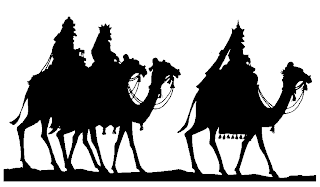Snippet from my Sermon on the Three Wise Men, pt I
Today is a day full of church words that most people don't understand and increasingly don't care to understand. Officially, at least in Western Christianity, we have something called "The Feast of The Epiphany of the Lord," this feast celebrates the epiphany (or manifestation) of Christ to the Gentiles, symbolized by Christ's manifestation to probably the group of the most curiously random characters to be found in the entire bible, but I will return to the We 3 Kings in moment.
The feast originally was more closely connected to Jesus' baptism, the primary theme of the feast in Eastern Churches to this day. In Eastern Christianity, Epiphany is actually referred to as an even more obscurely churchy word called the Theophany, if you want to get really technical comes from Greek theophania, meaning "appearance of God"). Eastern Christians also refer to this day as Theophany as "Holy Lights" because they baptize on this day, and baptism brings about illumination.
So, in a way, both Eastern and Western Christians are celebrating a Holy Day commemorating the same basic concept of Jesus as the Manifestation of God, although our Eastern Brothers and Sisters focus on the image of Jesus' baptism in the Jordan by John the Baptist. In the West, Epiphany traditionally marked the end of the Twelve Days of Christmas and so we get hung up on the images of these strangely tantalizing Three Wise Men, and whoever they were exactly.
The Magi are popularly referred to as wise men and kings, whether those are accurate English descriptors is somewhat debatable. The word magi is basically a Latin word that comes from a Greek word, which is perhaps borrowed from an Old Persion word, though linguist scholars are not definite on that. But there is an old Persian word that sounds similar to Magi which referred to a priestly caste of the ancient religion, Zoroastrianism, which is a religion that did a lot with the stars and astrology. (Not astronomy, mind you, but astrology meaning looking for portents and predicting the future by things that happen in the stars.)
So, some bible scholars logically assume that maybe the Magi in Matthew's gospel were Zoroastrian priests. If they were, they wouldn't have been kings. You couldn't be a priest and a king in Ancient Persia. But, who knows?
What is interesting is that the only other time the word Magi occurs in the bible in only two places, one is, of course, the story we hear today about what we curiously call in English the 3 Wise Men. The other time to word occurs is in the Book of Acts. Barnabas and Paul are on the island of Cyprus and run into this demon possessed person who is referred to as a Magi. It's almost a humorous incident because the guy's last name is bar Jesus, which means Son of Jesus in Hebrew.
But in Acts, Magi is translated into English as the derogatory term Magician, because Magi is where we get the modern word Magician, which is fairly typical of how the word was used in ancient Greeks texts outside the bible. Usually the term "magi" was a derogatory term in ancient Greek texts, almost like we would refer to a crackpot sorcerer or something whose out in the wilderness conjuring up who knows what black magic or whatever.
But, for whatever reason, Western Christian tradition on Epiphany has always venerated these Magi who come to visit the baby Jesus as wise men and not just random characters that might be dangerous crackpot astrologers or magicians.
There have been numerous traditions and legends that have grown up about the Wise Men. Typically we think of there being three wise men because of the number of gifts, but if you notice, Matthew doesn't tell us the exact number. In Eastern Christianity, they actually believe there were 10 Wise Men, or Magi.
The Syrian Orthodox Church believed there were three Wise Men, and have given them the following Persian names: Larvandad, Hormisdas, and Gushnasaph. Scholars to this day have no idea where the Syrian church got those names. I'm sure there was a great story behind that at some point but unfortunately its been lost to antiquity.
The famous explorer Marco Polo in the late Middle Ages claimed to have been been shown the three tombs of the Magi when he visited a town south of what is now Tehran, Iran. There is a shrine in the Cathedral in Cologne, Germany, that claims to have the relics, the bones, of the Magi.
Even Missionaries who went into China in the 1800's discovered a remnant of Chinese Christians who had been practicing a form of Christianity since the days of the Roman Empire before the trade routs collasped in the Dark ages. They discovered that this group of Chinese Christians who had been isolated for over 1000 years from Western Christianity's fixation with the Magi themselves had a legend that one of the 3 Wise Men had come from China.
Christians all over the world have been fascinated for centuries by these three, very minor but mysterious characters. For whatever reason, The 3 Wise Men have just captured the hearts and minds, you might say, of Christians since the early days of Christianity.


Comments